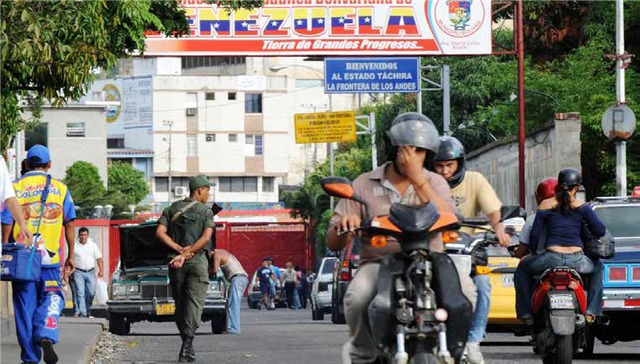BORDER CARD.

When Nicolás Maduro is in the presidency, since 2014 the Colombian oligarchy, through his government, has prevented the normality of the border area of more than two thousand kilometers.
This happened recently when trying to enter the territory called Humanitarian Aid that would enter through Cúcuta on February 22 of this year. It was not support for the Venezuelans, who live a difficult situation due to the financial blockade propitiated by the government of the United States for five years, but a blatant invasion of Venezuela. The operation failed, thanks to the civic-military union of the Bolivarian people that did not allow the entry of the three c amiones by the Francisco Paula Santander Bridge, which were later burned by policemen paid by the right-wing spokespersons as revealed by the American Media. The New York Time on March 10.
The attempt led to the closure of the Colombian-Venezuelan border, for three months by order of the Bolivarian Government in prevention of external interference. While remained closed, Venezuelans and Colombian passers used more than 300 open trails i legally to enter and leave both territories.
It affected Colombia by announcing the opening of the Colombian-Venezuelan border on the side of Venezuela's President Nicolás Maduro. On June 8, the flow of exchange between the two neighboring countries would begin again. Given the situation, the coordinator of the Civic Association of Colombians in Venezuela, Juan Carlos Tanus, said that in this period both nations lost; per or more the Republic of Colombia. "Always when close the border, who loses is the dependence Colombia Venezuela throughout its history, " said Tanus.
This dependence reaches 70% of the trade, says Tanus, so the development of the 13 departments, 66 municipalities on the Colombian side, have a direct link with the productive apparatus of Venezuela. "The two million 800 thousand Colombian residents living on the border can live thanks to the illegal extraction of inputs of goods subsidized by the Venezuelan government," said Tanus.
"The Colombian government has worked on the international stage the scenario of the migration as part of a crisis that the United States maintains. Colombia complies with the instructions from the United States against the Venezuelan reality, but Colombia does not support the presence of more migrants because it has not been able to solve their problems, "he said. It benefits Colombian entrepreneurs. The shortage caused by the trade blockade against Venezuela has caused the extraction of Colombian products to the country. Before this, Tanus warned to review the income of the same because the currency damages the Bolivar and gives a false hope to the Nueva granadinas companies. "To whom it brings a hope, it is to the Colombian companies, because it increases its production by the sale. The Colombian has no measurable Venezuelan soil, "he said, adding that it also affects the growth of the Venezuelan industry that is having its growth in times of crisis. Tanus proposes the review of the extraction of Colombian articles because it is accelerating inflation in Venezuela.
In the same way, he highlighted as positive the placement of a border card and the 120 officers of the border police, because it would allow the control, and passage of passers-by who enter Venezuelan territory.
Company of mercenaries in Cúcuta "The border card favors both countries because it is an input that has been working since 1959. It is important because it tends to regulate the steps and establish an orderly, safe migration, but which will also regulate the daily life of the border, will allow Colombians who enter can move freely, " he said. But, the Venezuelan State must take care of the movement of displaced people to Venezuela because according to Tanus there is the danger of installing a mercenary company, close to Venezuelan territory.
"I have information that there is a settlement of the British-Israeli private military war company named DynCorp International, which provides logistics services and maintenance of military equipment, in the Colombian city of Cúcuta, on the border with Venezuela. This company is already installed in other Middle Eastern countries such as Syria, Libya and Afghanistan, " he said. In addition, he indicated to the Colombian State that he was collaborating with the installation of DynCorp with offices and places that would allow the normal operation of the foreign company. In that sense, he regretted the submissive behavior of the neo-granadino government with the interventionist policies of the Americans against Latin America.
Faced with the alleged ordering of irregular groups, Tanus recommended taking measures for the entry of people into Venezuelan territory, as well as accelerating the different restrictions to prevent violent acts against the Venezuelan people.